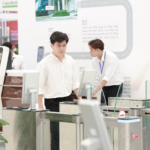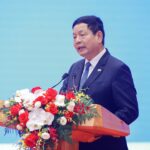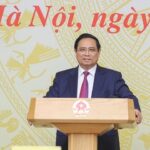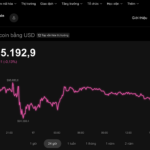Prime Minister Pham Minh Chinh has issued a dispatch regarding a gift for all citizens to commemorate the 80th anniversary of the August Revolution and National Day on September 2nd. This decision was announced after the Central Office of the Party communicated the Politburo’s agreement on this meaningful policy.
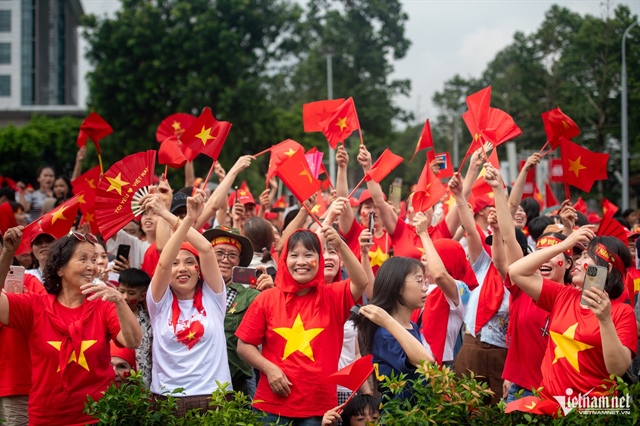
Each citizen will receive VND 100,000 as a National Day gift. Photo: The Bang |
Accordingly, every Vietnamese citizen will receive VND 100,000 as a gift for the Independence Day celebration. This thoughtful gesture comes as the entire country joyously prepares to mark the 80th anniversary of the August Revolution and National Day, reflecting the profound care and concern of the Party and State for all citizens.
A Gift of Trust
Distributing monetary gifts to citizens is a practice adopted by many countries worldwide, aiming to share welfare benefits with the people, allowing them to enjoy the fruits of their labor and contributions. This can serve as a stimulus for consumption, as seen in Thailand, Indonesia, and Saudi Arabia, or it can be a social policy to encourage young couples to have children and address population imbalance and aging, as implemented in Poland and South Korea.
For Vietnam, this is the first time such a universal policy has been applied to the entire population, regardless of wealth, gender, age, occupation, or social status. From newborns to centenarians, from urban to rural areas, and from lowland to mountainous and remote border and island areas, all citizens will receive this gift equally.
Although symbolic, this official information has been enthusiastically received by the people, putting an end to the unnecessary speculations of the past few days. With VND 100,000 per person, families can enjoy a warm and happy meal together on Independence Day. This gift conveys a message of the Party and State’s care, fostering community solidarity and promoting equality in society, as everyone shares equally in the country’s development achievements.
Beyond perpetuating the tradition of “great national unity,” this approach demonstrates our progression towards a modern welfare state, where every citizen is guaranteed social security. It marks a significant step in our journey to build a humane and just nation, integral to our overarching goal of a strong, democratic, equitable, and civilized Vietnam.
A Practical Test of Capability
Since last night, social media has been abuzz with questions, not about the authenticity of the gift announcement, but about how citizens can receive this meaningful gift before September 2nd, as instructed by the Prime Minister.
With a population of over 100 million, it is impossible to distribute the gift manually within a day or two; instead, we must employ modern and advanced solutions. Here, the VNeID application must play a pivotal role.
The Prime Minister has instructed the Ministry of Finance, the State Bank of Vietnam, the Ministry of Public Security, and the People’s Committees of provinces and cities to coordinate closely according to their functions and tasks. They are to immediately review the beneficiaries and deliver the gifts to the people through appropriate methods (bank transfer or direct distribution) as soon as possible, with a deadline before National Day on September 2nd.
Completing the task before September 2nd is crucial to preserve the gift’s original intent—a present for citizens to celebrate Independence Day.
The Ministry of Public Security has taken swift action, and banks have promptly provided guidance on the necessary steps to be carried out on VNeID to facilitate linkage with welfare agencies and local authorities. However, not all citizens have a VNeID, despite its growing prevalence in daily transactions.
Consequently, this policy has become a powerful catalyst for digital transformation, transitioning traditional administrative procedures to digital ones that are more agile, transparent, and accessible to all. This is a full-scale rehearsal for e-government and a practical test of our capabilities, as well as an evaluation of the new two-tier government model and the competence of our civil service system, assessing whether the state can reach every citizen.
The estimated cost of this initiative is over VND 10,000 billion, accounting for nearly 0.5% of the national budget. While a significant amount, it is well worth the investment to gain social trust, foster national unity, and make substantial progress in governance.
Whether willingly or not, citizens will have to open bank accounts to integrate into the digital economy, enabling them to access the new era of governance and social security with just a tap on their smart devices.
The amount of VND 100,000 may not change one’s life, but it connects more than 100 million Vietnamese people with a shared sense of pride and trust in the nation they call home. It signifies a more approachable, equitable, and humane State, with a robust social security policy taking shape.
Thus, this is an investment in the people—the most valuable asset for a country’s sustainable development.
Van Thieng
– 09:29 29/08/2025
Mai Linh – Embracing Technology, Propagating Green Values
On August 25, 2025, Mai Linh Corporation held its 2025 Annual General Meeting of Shareholders in Ho Chi Minh City with a spirit of innovation and embracing a new era of growth and transformation.
FPT’s Triumph: Prime Minister’s Trust in Truong Gia Binh Propels Stock to Impressive Heights
FPT’s stock has declined by over 34% since the beginning of the year. This significant drop has investors concerned about the future performance of the company. With a poor outlook for the upcoming quarters, it’s essential to understand the factors contributing to this decline and whether there are any potential upsides to this downward trend.
The Great Teacher Shortage: PM Calls for Review to Address 100,000 Deficit
The Ministry of Home Affairs, in collaboration with the Ministry of Education and Training and local authorities, is conducting a comprehensive review of teacher recruitment processes for the period 2022-2026. This review aims to propose supplementary staffing allocations up to 2030, ensuring a robust and sustainable education system.

